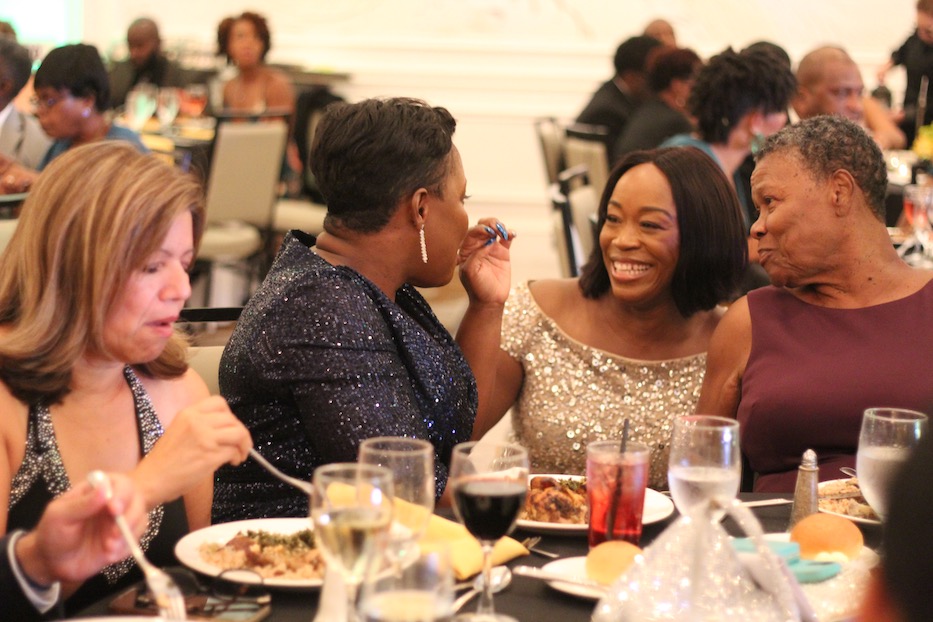
Caribbean | Culture & Community | Downtown | Immigration | Arts & Culture | New Haven Caribbean Heritage Festival
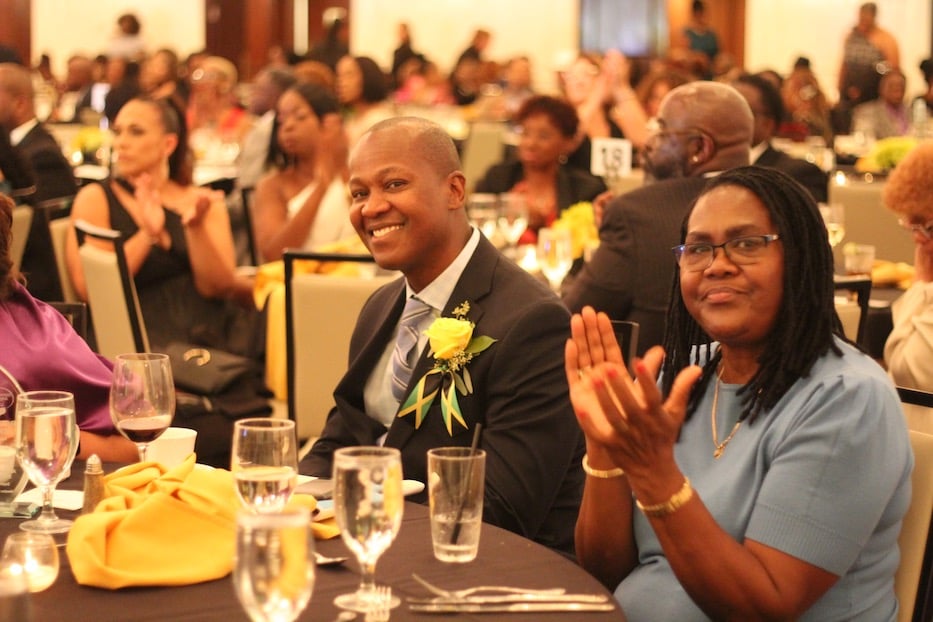
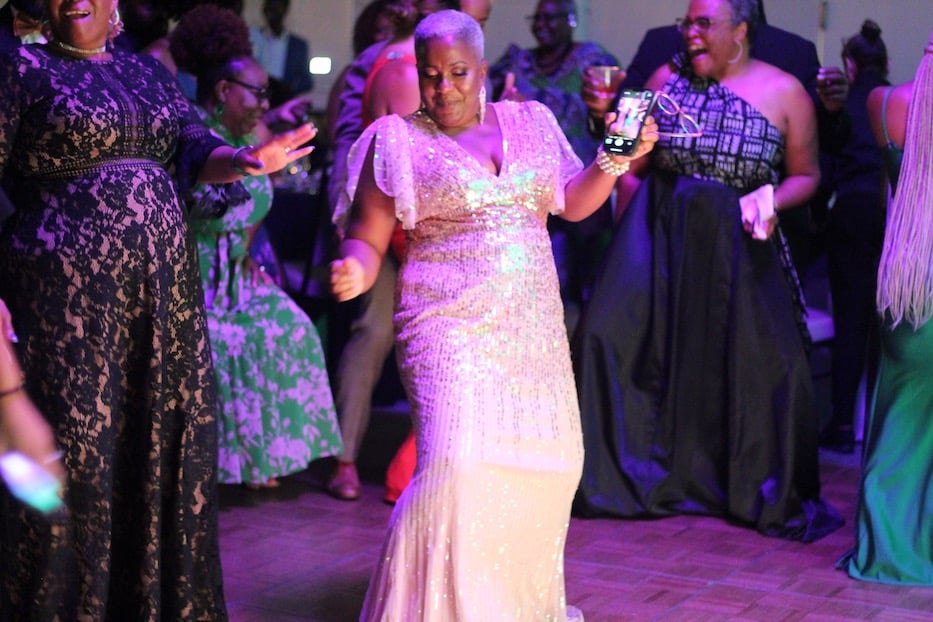
Top: Richard Simpson. Bottom: Karaine (Kay) Smith-Holness, president of the Jamaican American Connection. Lucy Gellman Photos.
The whole dance floor was vibrating, drenched in blue and purple light. On a stage, DJ Fire bounced with the crowd, one arm perpetually suspended in the air. On the floor, hands rose and swayed in time with the lyrics. Knees and shoulders unlocked to the beat. Somewhere in the center, a couple clasped hands and sank into a rhythm of their own making. The song faded right into the Master KG’s “Jerusalema,” and somehow the floor doubled in size, a rainbow of glitter, georgette, and organza.
It marked the culmination of the Jamaican American Connection’s annual Trailblazer and Scholarship Gala Saturday night, held at the Omni New Haven hotel on Temple Street. Back in person for the first time since 2019, the event celebrated steel pan virtuoso Kenneth Joseph and JAC member and treasurer Richard Simpson, a senior director of research and development at Medtronic. In addition, it awarded scholarships to students Kayla Smith, Tara Malcolm, and Jaye-Ann Walters. All of them are college freshmen who plan to study nursing.
By the end of the evening, it became a joyful and long-needed celebration of the Caribbean diaspora, complete with pre-taped steel pan demos, acceptance speeches woven with laughter and patois, plates stacked with plantain, callaloo, salmon, and jerk chicken, and a dance floor soaked in soca and dancehall. The timing is particularly meaningful: the island celebrates 60 years of independence from the British Crown this year.
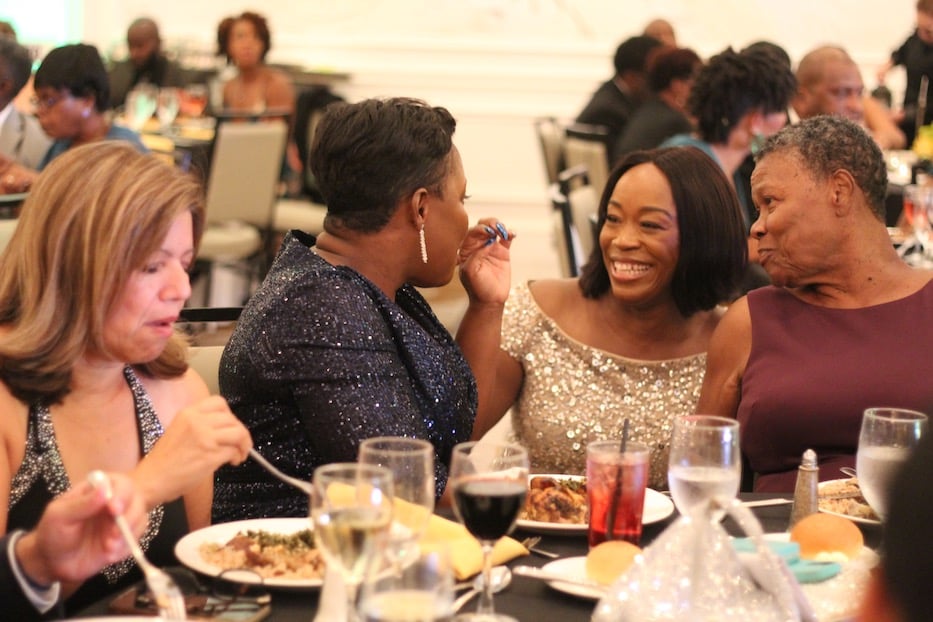
Lucy Gellman Photos.
“It’s very hard to explain to people why we need to be together,” said JAC President Karaine Smith-Holness, at times holding back tears. “Not just as Jamaicans, or Trinidadians, but everybody across the diaspora. If we come together, there’s nothing we can’t do.'”
In Connecticut, there are nearly 40,000 state residents who were born in Jamaica, according to the most recent U.S. Census. Roughly 56,000 more people in the state claim Jamaican heritage, from first generation college students to artists, professors, doctors, and cultural ambassadors. As if on cue, Gov. Ned Lamont announced nonstop airplane service from Hartford to Jamaica earlier this month.
From the moment attendees stepped out onto the second floor lobby in sequins, all manner of bright silk, tencel, and death-defyingly high heels, that call for solidarity seemed to echo everywhere. Outside the ballroom, friends and colleagues posed against a backdrop of green, black and gold ribbon, the strings dancing in the light as they formed the colors of the Jamaican flag. Inside, they took in a glammed-up JAC backdrop from DJ Fire (a.k.a. Tafari Turner), complete with the organization’s acronym hanging in large black letters behind him. A Jamaican and American flag waved from the monitor below.
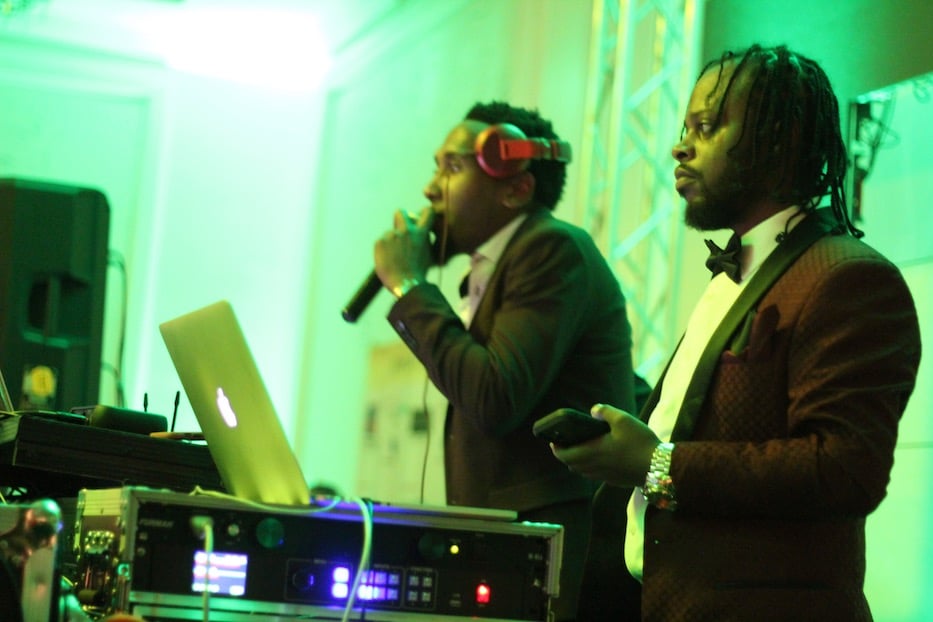
DJ Fire (at left) in action. Lucy Gellman Photos.
They didn’t have to wait long for the party to begin; it was everywhere. On stage, DJ Fire slid into Kes’ “Hello,” making it hard for attendees not to dance as they greeted friends, buzzed from table to table and found their seating assignments. Taking the mic in the center of the dance floor, emcee and Braata Productions Executive Director Andrew Clarke called latecomers into the room, tossing out the promise of dinner that seemed ever closer.
But it was when he called the audience to attention for the American and Jamaican national anthems that something shifted, and it felt like the gala was officially underway.
At first, a listener could have heard a pin drop. Drums and bombastic horns rolled across the room, the Star-Spangled Banner booming from a speaker on stage. But when the word’s to Jamaica’s anthem began—Eternal Father bless our land! Guard us with Thy Mighty Hand!—hundreds of voices rose in unison. The song drew a line right back through history, tying the song’s birth to New Haven’s vivid present.
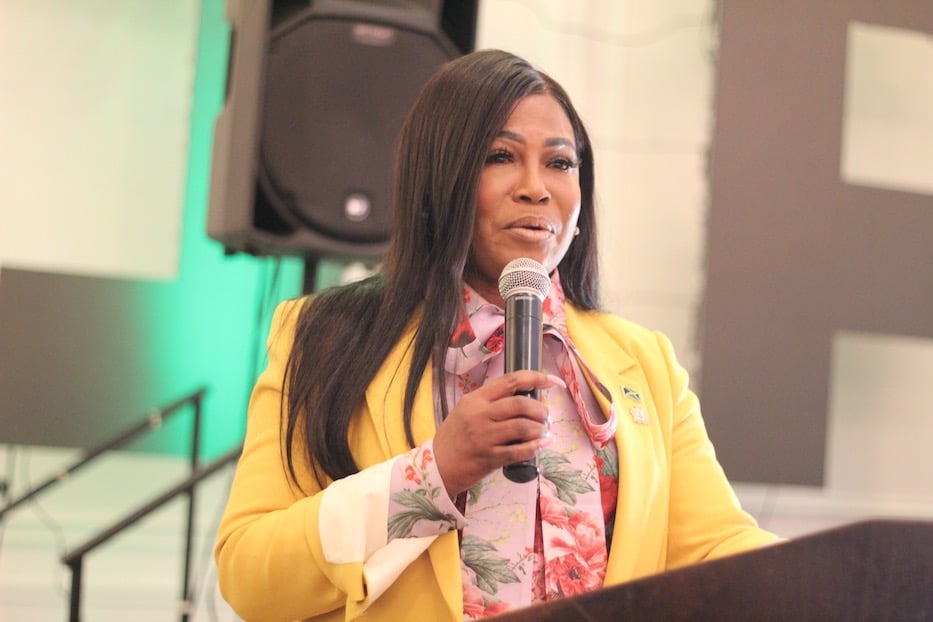
Consul General of Jamaica Alsion Wilson. Lucy Gellman Photos.
No sooner had it ended than both speakers and awardees drove home the sheer magic of the night, including the ability to gather after so long in isolation. When Smith-Holness announced that “we’re finally here,” the room erupted in applause. Taking the podium just moments after her, Consul General of Jamaica Alsion Wilson also called it a blessing to be together.
She remembered listening to the radio in her car earlier in the day, and hearing that Jamaica was no longer under a tropical storm watch as Hurricane Ian veered West. It felt like fate.
“I said, ‘God bless Jamaica,’” she said. Later in the evening, she walked attendees through the process of applying for dual citizenship as they nibbled their way through the dessert course, thick cheesecake kissed with a dollop of chantilly cream.
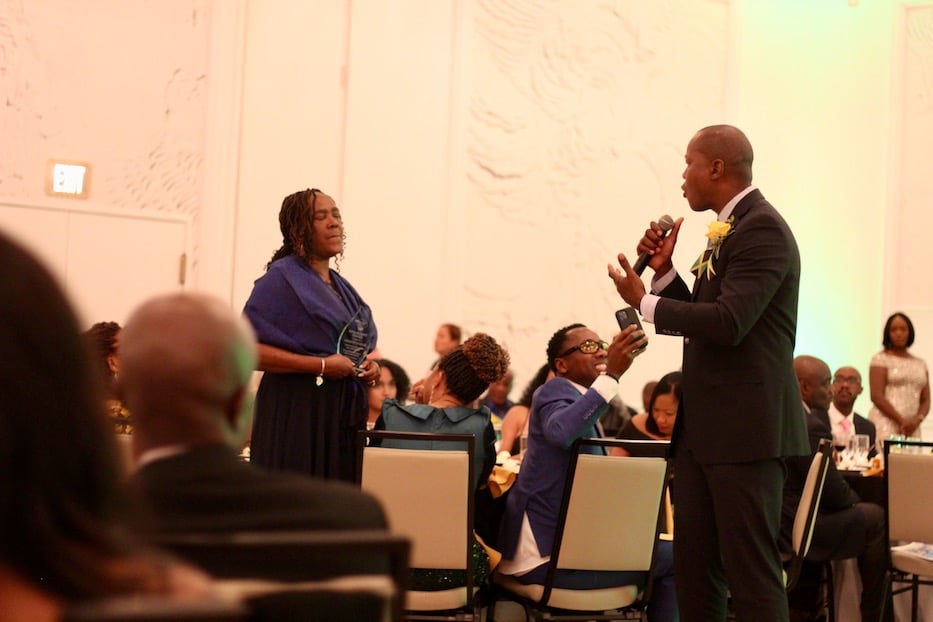
Richard Simpson presents his award to his mom, Elsa. Lucy Gellman Photos.
Awardees, too, carried that sense of momentum with them. Accepting the first trailblazer award from Dr. Sherene Mason, a pediatric nephrologist at the Connecticut Children's Medical Center and herself a proud Jamaican immigrant, Simpson recalled growing up as the child of a single mother, watching her strive and struggle as she tried to make the road easier for her son. As he spoke he looked to the table where she sat in a long blue gown, holding on to every word.
His story is the story of so many Jamaican Americans in the U.S., he told attendees. Simpson was born in Jamaica, and then moved to the U.S. when he was still young. In Connecticut, he thrived, earning degrees from Fairfield University and then later Southern Connecticut State University. He pointed to both the difficulty of the United States and its possibility, noting that “we get to take the opportunity of all it has to offer.”
While he is known publicly for his work at Medtronic, he said, his life is so much richer than that: he also acts as the treasurer for JAC, cycles avidly, and is an adoring father to two daughters. Walking out onto the dance floor, he presented the award to his mother, Elsa, who beamed as he held his arms out to her for an embrace.
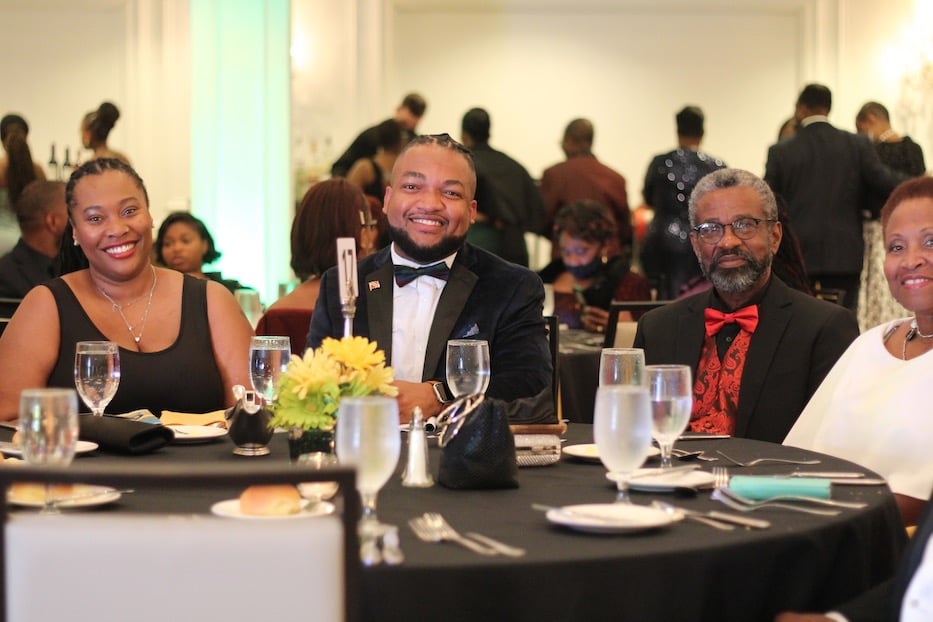
Kenneth Joseph (second from left) with Danielle Sanderson, Hayden Worrell and Donna Pantin-Worrell. Not pictured are friends Michael and Shirley Givens and Simone Snead, who also attended. Lucy Gellman Photos.
That spirit flowed through an acceptance speech from Joseph, a native of Trinidad and Tobago who moved to the U.S. in 2008 for a graduate degree in music, and has led St. Luke’s Steel Band since 2010. Born and raised in Trinidad, Joseph started playing the steel pan when he was eight years old, and his godmother gifted him lessons after a glowing report card. It was June 1990, and little did Joseph know, the instrument was about to change his life.
Originally, he didn’t like the drum’s sound—a tinkling, ringing and resonant bounce that he has come to welcome as it rises from the pan. But as he learned how to play, he stayed with it. He did not have music classes in his high school, and so learned on his own and took music theory instead.
He did not plan for the pan to be his life, he said Saturday. Instead, it was ultimately a job manager at a fast food restaurant who urged him to return to school for music, which he did. After studying at the University of the West Indies, he headed to Northern Illinois University for his graduate studies in music. In New Haven, he both directs the St. Luke’s Steel Band and is the dean of student culture at Booker T. Washington Academy.
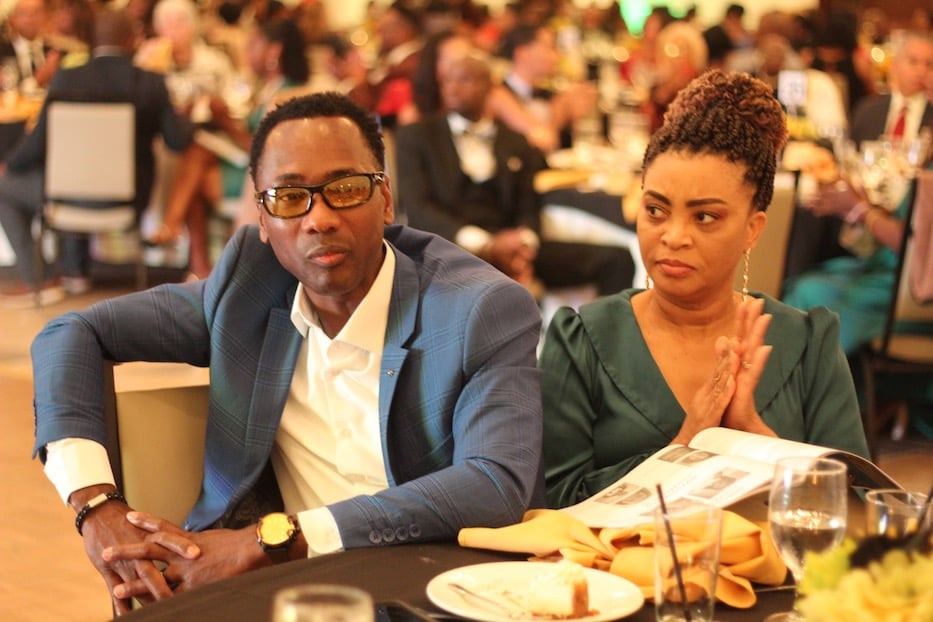
“It’s amazing, to be recognized by another organization outside of your own,” he said, noting that Saturday marked Republic Day in Trinidad and Tobago. “It speaks volumes. The pan ancestors are the ones who I have to channel [tonight], because without them and what they have done, there would be no me.”
When he plays pan, he added, he knows that he is carrying on a tradition of struggle and of resilience; that there are people who died so that he could study and teach the instrument. Because Joseph’s family was unable to make the gala—he has two sisters in New York, and his parents and a third sister live in Trinidad—he brought along his pan family.
In the last 12 years in New Haven, he has become beloved by musicians at St. Luke’s, where he routinely makes magic inside the Whalley Avenue sanctuary. At the church, he teaches multiple groups, including the PANdas, PANstars, and PANatics.
“I hope that my journey can inspire others,” he said to applause as he accepted the award.
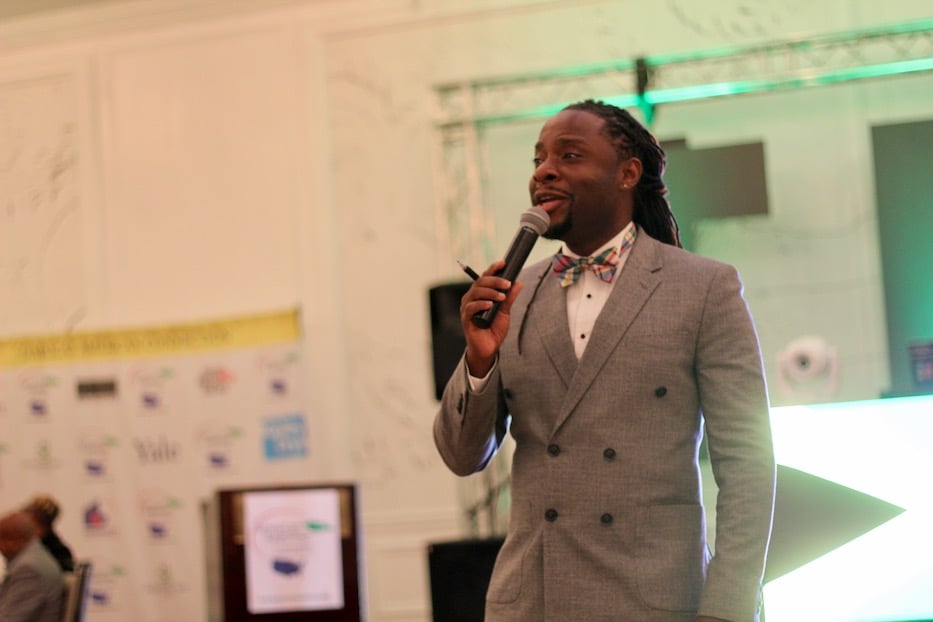
Emcee and Braata Productions Executive Director Andrew Clarke.
In many ways, that delight and depth across a diaspora is the story of the JAC as it continues to evolve. After bringing back its annual Caribbean Heritage Festival in the summer of 2021, the June festival moved downtown last year, building new partnerships with the Shubert Theatre and the International Festival of Arts & Ideas. As it has continued to grow, it has worked to both amplify the voices of Caribbean Americans and support students, particularly those pursuing higher education. Since starting its gala, JAC has awarded 25 scholarships.
Giving out one of the scholarships, Dr. Kimala Bisasor-Williams praised the organization as looking out not only for adults living across the diaspora, but also for the young people who are the future of the organization. She smiled as she brought up Tara Malcolm, a 2022 grad of James Hillhouse High School who is now at Southern Connecticut State University.
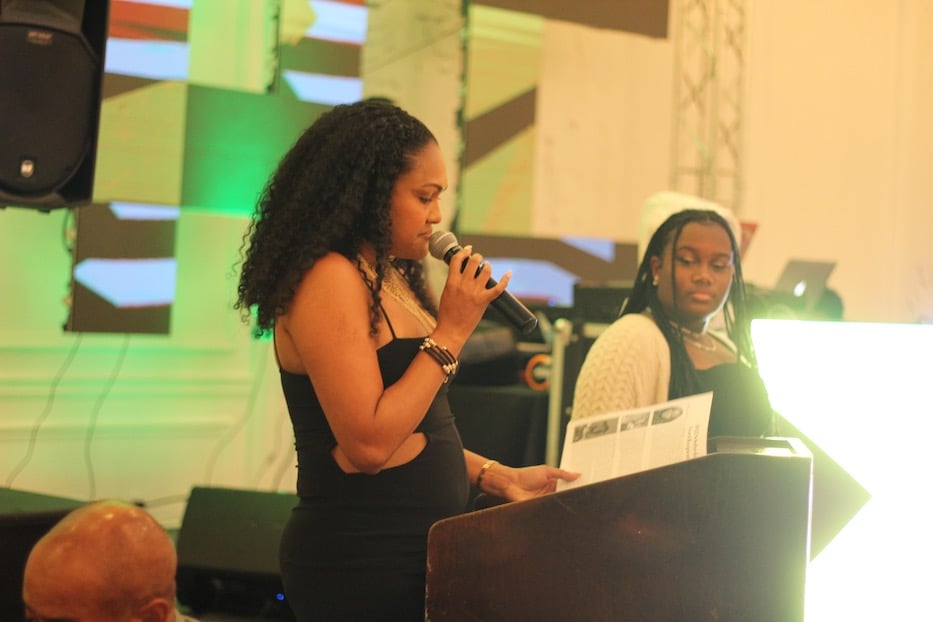
Dr. Kimala Bisasor-Williams and Tara Malcolm, who hopes to become a nurse. Lucy Gellman Photos.
It has also crowned a few “honorary Jamaicans,” including former New Haven Independent reporter Markeshia Ricks, who now leads the Youth Arts Journalism Initiative, and Launch Consulting LLC President Kia Levey-Burden. Saturday, Smith-Holness thanked Ricks in particular for her steadfast support of JAC and the gala, from 2 a.m. phone calls to last minute planning details.
Indeed, even keynote speaker Anthony McDonald captured it as the gala’s ceremony neared its end, and DJ Fire prepared the crowd for a night of dancing. The child of Jamaican immigrants raised in New Jersey, McDonald recalled feeling “an additional weight on my shoulders” from the moment he walked into the Shubert, and made history as the theater’s first Black executive director (and theater’s first leader of color ever, since its founding in 1914).
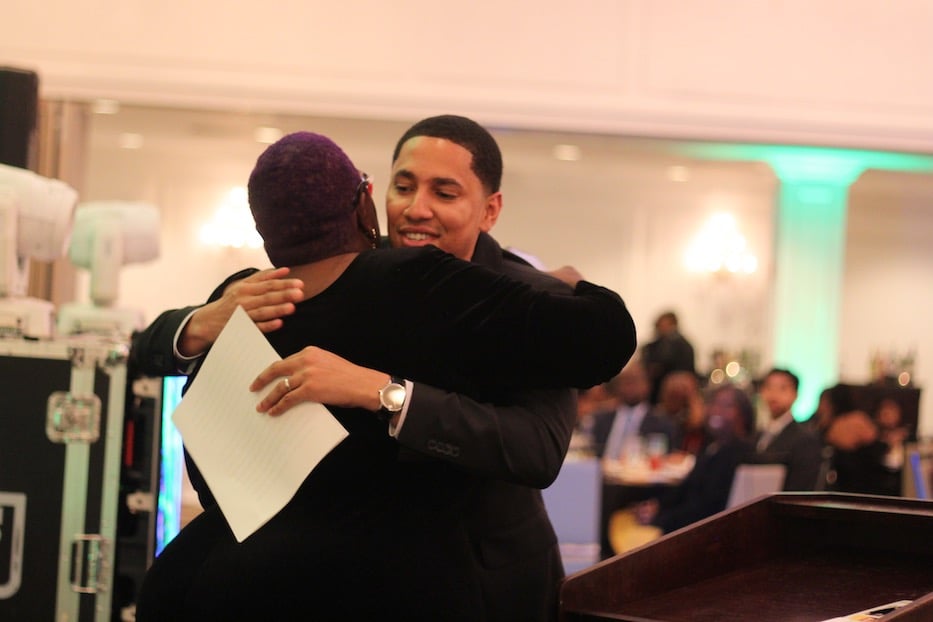
Shubert Theatre Executive Director Anthony McDonald and Babz Rawls-Ivy, who introduced him. Lucy Gellman Photos.
He knew that he was breaking a barrier that had existed for over a century, he said—and wanted to bring other people in the community with him.
“I asked them, ‘What has the Shubert done for this Caribbean community?’” he remembered asking his colleagues, genuinely curious. The answer was nothing at all. And so he started planning.
Even before the theater’s doors were open, he began to think about the performers he wanted to bring into the space. They were artists who reflected not just his lived experience, but all of New Haven’s. In just over a year, he has brought in the Jamaican jazz pianist Monty Alexander, Dance Theatre of Harlem, and musicals meant to provide enough variety for everyone. Next year, he said with a smile, audiences will be able to witness the National Dance Theatre Company of Jamaica, back in Connecticut for the first time since 2004.
“My roots, my history, my love for Jamaica runs deep,” he said to thunderous applause. He urged attendees to come to shows, and spread the word that the Shubert, steadily, was changing to look more like its home city and state. “Let’s end the false narrative that we don’t support one another.”

